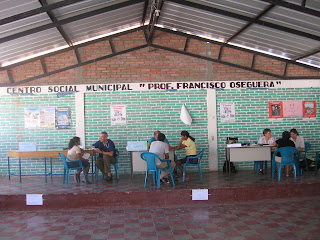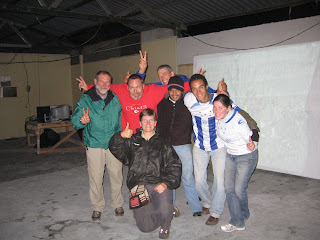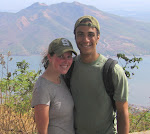
Dan translating
Although it may sound like sensationalism to include these next few observations, truly the purpose is to describe what daily life is like in many of the communities we’ve visited. One little girl we visited was sneezing up worms, which, fortunately, is easily treated. In another town, after we had already finished a full days work a young man in his twenties came to the home where we were staying, escorted by his elderly father; his hands were a mere mess of blood. The young man, who is right handed, had been cutting through something, which he held in his right hand, when the knife suddenly broke through the object he’d been cutting and immediately sliced deep into his ring, middle, and index fingers. It seems that the tendons in his middle and ring fingers were completely severed, for which he’ll need reparative surgery to fix. Fortunately one of the doctors in our group, an emergency room physician, was able to stitch up the man’s hand with the help of the other members of the team, at least stemming the blood and giving the young man an opportunity to seek further medical attention in the coming weeks and months. We also saw a number of patients with psychological problems, some of which stemmed from the flooding, others of which were perhaps exacerbated by the flooding, or were in fact unrelated to it. We spoke with people who suffered from depression and loneliness, at least one person who seemed to suffer from mental illness but had never received counseling, yet more people who had been victims of domestic violence or sexual abuse, and for many people the subtext to all of their hardships was that they had been displaced by the flooding, or at the least that their dwellings and livelihoods had been compromised by the storm.

Emily to the right translating along with the Docs in "El Centro Social Municipal"
Many of the communities we visited were difficult to reach, leaving us bouncing around in the back of the truck with all the medical supplies during a rainstorm, but some of the villages were nearly impossible to reach, and had we not been there, they would not have received medical assistance. The main bridge of one community was washed out so we had to walk across a cable bridge, which the community had dubbed “la hamaca” or “the hammock” because of the way it swayed when people walked on it. This bridge was constructed with five heavy metal cables: two as railings to hold on to and three on the bottom. Community members had placed wooden boards across the three cables to walk upon, but in many places there were two or three boards in a row missing and the only option was to walk across the cable. Fortunately no one in the group was afraid of heights! Another community was inaccessible except by boat or walking waist-deep in water, so we, and all the medical supplies, were transported by boat. Life in the Peace Corps is typically a humbling experience but these past few weeks of working in a supportive capacity to this medical brigade and the people they’ve been treating has punctuated that sense of humility.

Traveling with two nurses and the medical supplies
While Emily worked with the medical brigade for the entirety of two weeks, I was only there for a week and a half. For the latter half of the first week I helped translate for a British engineer who was flown in to help install two temporary water plants in communities whose water systems had been damaged during the storm. For anyone who has a knack for assembling and disassembling machines, and certainly for any engineers who read this I can say that it was interesting to be part of the process of installing these temporary water plants which are accompanied by 10,000 liter inflatable tanks. These water plants consist of three parts: a primitive crank start diesel powered pump which pulls water from a nearby source (a creek for instance), a filter which utilizes a series of probably 30 plastic tubes, approximately 1 cm x 40 cm, which, with the help of a fine powder constitute the first of a two part treatment process, and a third machine that dispenses chlorine in small quantities before the water finally arrives at the inflatable tank. These filters were last used in relief efforts for the Christmas tsunami of 2005. If I’m not mistaken, the filters were brought out of a warehouse somewhere in southeast Asia, put on an American Airlines jet and a week later were delivered to Honduras. Aside from marveling at the efficacy of this quick installation water treatment plant (it takes approximately 3 hours to install the system and educate someone on how to operate and maintain it), I’ve also learned a bit about the potential conflicts in marching into a community and introducing new technology without adequate preparation beforehand. While in one community we found people who were familiar enough with plumbing and water systems to quickly learn how to operate the system we were installing, in another community the people we were teaching how to operate the system didn’t have enough prior experience to feel comfortable operating the system without extensively repeating the lesson, which created a palpable sense of tension at times. Everyone involved was there of their own volition, to help, nothing more. Good intentions aside, I do wonder how might the installation have gone more smoothly – aren’t there always new lessons to learn?

The water system
As far as major sporting events go in Honduras, the November 19th fútbol game against Mexico was as good as it gets. The game was to decide which teams would pass on to the next round of qualifying games for the 2010 World Cup and if Honduras lost, they would be eliminated. We, the doctors from the brigade, and another translator, went to a “sports pub” to watch the game projected onto a large wall. After a tense and cold (another cold front passed over Honduras last week and had us wearing fleeces and hats again) first half, the game was still 0-0. In the second half, Honduras scored a goal through a corner kick that went off the foot of one of the Mexican defenders. Honduras went on to win the game 1-0 and honking cars could be heard late into the night celebrating the country’s victory. We’re looking forward to the next round, which will start in February, and give us another occasion to wear our selección shirts.

Dave, John, Digger, Cathy (all Medical Teams International volunteers),
Daniel, Daniel and Emily (the translators)
Since ending our stint as traveling translators we’ve been back to one of our most practiced pastimes, home shopping. Despite our best efforts, the most promising homes we’ve seen thus far haven’t worked out, for a variety of reasons. As we imagine we’re preaching to the choir here, we’ll keep this relatively short; when home shopping, it seems the whole trick to the game is to get back on the proverbial pony and just keep going, even when you’re sick of being shown that repugnant pink house time and again. It would make sense to mention that there’s no “official” process by which people search for homes here in Siguatepeque. The objective is to wander the streets in neighborhoods which you like, asking anyone who seems potentially knowledgeable about the housing market whether they know of anyone who is renting a home (interestingly, the only group excluded from our canvassing effort is the 5 years and under crowd). Our favorite strategy is to speak with the owners of corner stores, known as pulperias, and launch into our routine, “Disculpe (Señor, Señora, Don, Doña), andamos buscando una casita con dos cuartos, una cocina, un baño, y poco terreno. ¿Sabe si alguien está alquilando una casa en este barrio?” Finding a home with two rooms, a kitchen, a bathroom, and a little bit of land has proven to be a challenge, no doubt. However, as Queen’s Freddy Mercury so famously belted all those years ago, the show must go on. Wish as luck, if you will.
A few days ago, we celebrated Thanksgiving with a couple of friends in the department of Santa Barbara. Jessica and Brenna had already started on dinner when we got there on Thursday around noon, so we ate lunch with them and got back to cooking. When it was all said and done, dinner consisted of a baked chicken, green beans, stuffing, mashed potatoes, pumpkin pie, and wheat rolls (all from scratch). We also enjoyed a bit of wine during the cooking process and with dinner. We hope you all had a wonderful Thanksgiving and were blessed with friends, family and a great meal. ¡Hasta la proxima vez!

Thanksgiving dinner...yum!

Jessica, Brenna, and Dan eating on the deck
